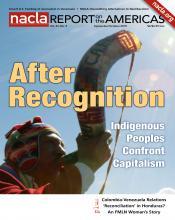After Recognition: Indigenous Peoples Confront Capitalism

This issue of the NACLA Report explores the contributions and creative possibilities of indigenous movements at a moment when indigenous politics has moved beyond requests for state recognition and inclusion. In this period “after recognition,” indigenous activists, organizations and communities are challenging both the claims that liberal national states exert over indigenous resources and territories, and the misplaced social and economic priorities of neoliberal capitalism.
September/October
2010
Volume:
43
Number:
5
